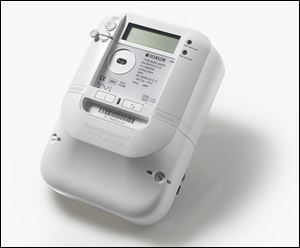
Smart grid may glean more data than watts
6/6/2010
What other data can this Smart Meter obtain?
The "smart" electric grid may be just a little too smart. Once a smart meter is attached to a home it can gather a lot more than just how much electricity a family uses.
It can tell how many people live in the house, when they get up, when they go to sleep, and when they aren't home.
It can tell how many showers they take and the number of loads of laundry they do. It records how often they use the microwave, how much television they watch, and what kind of TV they watch it on.
Across the country 52 million smart meters will be installed by 2015, according to a Federal Energy Regulatory Commission estimate. In Ohio, American Electric Power has installed 110,000 such meters in the Columbus area and Duke Energy has installed 80,000 in the Cincinnati area.
FirstEnergy Corp., which owns Toledo Edison, doesn't have any smart meters in place but is awaiting federal and state funds to install 5,000 in the Cleveland area perhaps by next year and eventually to have 39,000 more.
"This is technology that can pierce the blinds," said Elias Quinn, author of a smart grid privacy study for the Colorado Public Utilities Commission. Almost 200,000 smart meters are being installed in Colorado.
"Insufficient oversight could lead to an unprecedented invasion of consumer privacy," Mr. Quinn warned in a report to the utilities commission.
Law enforcement, government agencies, and corporations, such as Microsoft Corp. and Google Inc., are eyeing the information that the meters provide.
The transformation of the electric grid into a two-way energy and communication system is seen as a way to better manage power and improve efficiency.
The federal government has put up $3.4 billion to help speed smart-grid development.
The technology, however, poses new questions for consumer and privacy advocates, state regulators, and federal officials.
How do you protect the information? Who should have access? What happens if the information falls into the wrong hands?
"Privacy and cybersecurity are among the greatest challenges in implementing the smart grid," Nick Sinai, energy and environment chief at the Federal Communications Commission, said.
Federal agencies and some states - including Colorado and California - are moving to deal with privacy and security risks the smart grid poses.
The Colorado Utilities Commission opened a docket in August to gather comments on whether state rules governing privacy are sufficient.
New rules are needed, said Bill Levis, director of the Colorado Office of Consumer Counsel.
"The Fourth Amendment guards against unreasonable search," he said. "But I don't think the founding fathers could ever have thought of this kind of stuff."
The FCC's Mr. Sinai said that one lesson from the Internet is that building in privacy and security protections at the start is cheaper and more effective.
Colorado utilities, executives say, have been collecting and protecting customer information for years.
"The level of data we receive with the smart grid may change, but the privacy principle remains very much the same - specific data stays between us and the customer," said Megan Hertzler of Xcel Energy, which is installing some of the smart meters in Colorado.
Still, Xcel is "getting a lot more requests for customer usage information now that it is seen as more desirable," she said.
Most of the inquiries are from firms that want the information for marketing. Executives said Xcel has not released any of the data, and they declined to name the firms making the requests.
The key differences between meters on the sides of most houses now and the smart meter center on time and communication.
Meters are read, or an estimated reading is made, once a month, but smart meters take readings every 15 minutes. Future models may take readings every 6 to 8 seconds. The data is instantly communicated to the utility by fiber optic-cable, broadband, or WiFi.
Manufacturers - including General Electric Co. and Whirlpool Corp. - are developing "smart appliances" that will be able to communicate with the smart grid and garner even more information.
"Smart meters, smart appliances, smart outlets will continually collect information - the type of information that isn't addressed by current laws," said Rebecca Herold, a privacy, security, and compliance consultant.
Annabella Lee, the institute's senior cyber security strategist, said, "There are going to be all kinds of demands for smart-grid information."
Seeking to tap into the smart grid, Google's PowerMeter and Microsoft's Hohm are online tools consumers can use to analyze their home electricity data.
"We recognize our responsibility to protect the data that users entrust to us. ... We don't sell users' personal information," Google said in testimony to the California Utilities Commission in April. "
Government agencies are also looking for the data.
The City of Boulder wants it for checks on its energy-efficiency and carbon reduction-climate change programs, plus census tract, neighborhood, and housing class data, said Karsa Mertz, an environmental manager.
Law enforcement is one sector that will seek specific information, said Joel Margolis, senior director of Neustar Inc.'s legal compliance unit.
Neustar is a clearinghouse for telecommunications and Internet firms and handles compliance with law enforcement demands for its clients.
Smart meters could help locate marijuana grow lights, the klieg lights and camera of a child pornographer, and the site of a sweat shop or a brothel.
"There is a conflict here between two very valuable and well-intentioned policies - privacy and the needs of law enforcement," said Mr. Margolis, who at one time was an attorney for the U.S. Drug Enforcement Agency.
But the data could fall into the hands of criminals.
The smart meter could "tell a robber what kinds of appliances you have, what kind of flat-panel TV you have, and when you're not home to steal them," said Mr. Quinn, who is the author of the Colorado utilities commission study.